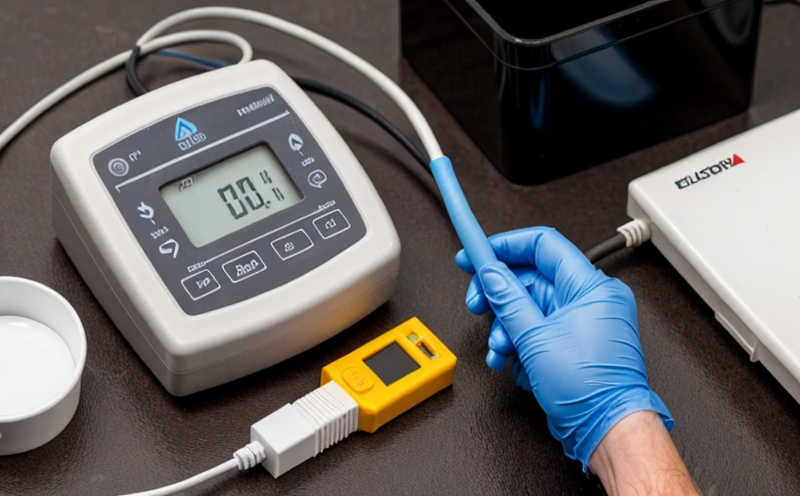Electrochemical Testing
In the realm of chemical testing, electrochemical methods have emerged as a cornerstone technique for analyzing and characterizing materials, especially in sectors where surface integrity, corrosion resistance, and material compatibility are critical. Electrochemical testing encompasses a variety of techniques that leverage the principles of electricity to probe the properties and behavior of materials under specific conditions.
This service is particularly relevant for quality managers, compliance officers, R&D engineers, and procurement professionals who need detailed insights into how electrochemical processes affect product performance. By understanding these processes, stakeholders can make informed decisions about material selection, process optimization, and product longevity.
The electrochemical testing methods are widely used across various sectors such as aerospace, automotive, electronics, and pharmaceuticals. In the aerospace industry, for instance, electrochemical tests help in assessing the resistance of materials to corrosion under extreme environmental conditions. Automotive manufacturers rely on these tests to evaluate the durability of components exposed to harsh road environments. Electronics firms use electrochemical testing to ensure that connectors and interfaces can withstand the rigors of repeated electrical connections.
The pharmaceutical industry also benefits from electrochemical testing, particularly in ensuring the integrity of drug delivery systems. These methods allow for precise measurement of ion migration and electrode reactions, which are crucial for maintaining the efficacy and safety of pharmaceutical products.
Electrochemical testing is not just confined to material science; it plays a pivotal role in understanding complex biological systems as well. In biotechnology, these tests help in evaluating the interaction between biomaterials and living organisms, ensuring that implants and prosthetics are safe and effective.
The primary goal of electrochemical testing is to provide reliable data that can be used for quality assurance, regulatory compliance, and innovation-driven product development. This service ensures that materials meet stringent industry standards set by organizations like ASTM, ISO, and IEC.
Scope and Methodology
The scope of electrochemical testing is broad and encompasses a range of techniques including potentiometric titrations, cyclic voltammetry, linear sweep voltammetry, and galvanostatic tests. Each technique serves specific purposes depending on the objectives of the test.
- Potentiometric titrations are used to determine the endpoint in acid-base reactions by measuring the potential at which a change occurs.
- Cyclic voltammetry involves scanning the potential over a range and observing the current response. This technique is useful for identifying redox processes within a material or system.
- Linear sweep voltammetry provides detailed information about an electrochemical process by sweeping the potential linearly across a specified range.
- Galvanostatic tests involve holding the current constant while measuring the potential and are particularly useful in studying the behavior of batteries and fuel cells.
The methodology behind these techniques involves careful selection of electrodes, electrolytes, and reference materials. The specimens to be tested must undergo rigorous preparation to ensure they accurately represent the material being evaluated. This includes cleaning, drying, and sometimes modifying the surface to achieve uniformity across samples.
Once prepared, the specimens are subjected to a series of tests under controlled conditions. These conditions can include varying temperature, humidity, and exposure times depending on the specific requirements of the test. The results obtained from these tests provide detailed insights into the electrochemical properties of the materials being analyzed.
Benefits
- Accurate measurement of ion migration and electrode reactions, providing precise data on material behavior.
- Potentiometric titrations determine the endpoint in acid-base reactions with high reliability.
- Detailed information about redox processes within a material or system, enabling comprehensive analysis.
- Assessment of long-term durability and stability under various conditions, ensuring product longevity.
Quality and Reliability Assurance
The quality and reliability assurance in electrochemical testing are paramount. Rigorous adherence to international standards ensures that the tests produce consistent and reproducible results. This is crucial for maintaining high-quality standards across all products and ensuring compliance with regulatory requirements.
Our laboratory employs state-of-the-art equipment and highly trained technicians who have extensive experience in conducting these tests. We ensure that each test is conducted under controlled conditions to minimize variability and maximize accuracy. Post-test analysis involves thorough review of data to identify any anomalies or inconsistencies, ensuring the reliability of the results.
The commitment to quality extends beyond just the testing process. Our team works closely with clients to understand their specific needs and tailor the testing approach accordingly. This collaborative approach ensures that our services meet the highest standards of excellence.
Frequently Asked Questions
- Accurate measurement of ion migration and electrode reactions.
- Precise determination of endpoint in acid-base reactions.
- Detailed information about redox processes within a material or system.
- Assessment of long-term durability and stability under various conditions.





